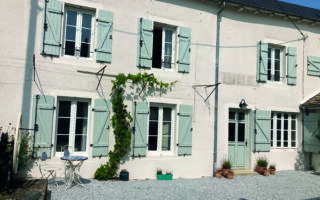Renovating and Running a Gîte in France

- Sun-kissed gîtes: Sue and Simon found inspiration for their renovations through a shared passion for blending the old and the new
- The heated pool is enclosed by flowering shrubs for total privacy
- Clean lines in the lounge make the most of the gîtes’ original features
- The ‘king room’ boasts traditional bedside tables
Sue & Simon Paine, who have stylishly renovated properties near La Rochelle, answer our questions about doing up a French home and also offer some sound advice to buyers. They provide essential advice for anyone considering renovating and running a gîte in France…
FE Mag: When (and where) did you buy the house?
Sue Paine: We bought the house in 2003 from an independent estate agent based in La Rochelle.
Was it your first French property/business and what was your background?
Yes, on both counts. I was a fashion buyer in London and Simon was working in Business Development for a corporate company.
What condition was it in?
The house itself was habitable and needed some updating but the barns (now gîtes) were cow barns with mud floors and a roof!
What were your main challenges?
To begin with, learning the French regulations and rules regarding property renovation and working to a tight deadline as we’d already taken bookings before the first gîte was completed. Having very small children meant that my time was very limited in terms of helping Simon. The following year, when they started at pre-school, it was freed up considerably.
[mrb]
What workmen did you use, if any?
We employed a company to install the pool and the fosse septique (septic tank) as these weren’t our areas of expertise.
What was your inspiration for the look and feel?
We were very keen that the gîtes felt very comfortable and welcoming with modern comforts. The styling was inspired by our love of mixing old and new, especially as we have always been interested in antiques and brocante.
What experience did you have undertaking renovations and remodelling interiors?
We’d previously renovated our Victorian house in London from scratch, on a very tight budget, doing most of the work ourselves at weekends and evenings.
Where did you source the furniture?
Mostly from dépôt-ventes and brocantes, painting and upcycling along the way. For new equipment, such as mattresses and kitchen appliances, we trawled the internet for the best prices.
What advice would you give to anyone in your shoes, who’s thinking of buying French property and relocating?
Having some ability to speak French when you arrive here isn’t to be underestimated. We learnt as we went along, which is fine, but I’ve no doubt that things would have been speeded up, especially early on, had we possessed better French. Speaking French also helps you to integrate much quicker with your neighbours, who we found were always willing to offer us some friendly advice and help.
Budgeting really carefully is vital. I kept tabs on everything we spent, even down to the last teaspoon. We came in just under budget, I’m pleased to say!
Getting to know the Maire (Mayor) is a very good idea, too. You may need him or her on your side when it comes to planning permission. Our housewarming proved very successful in getting to know the locals. The Maire particularly enjoyed that afternoon as the champagne flowed and luckily everyone could walk home!
Looking back, it was important to have a fixed deadline as things can easily drift if you’re not careful. We were still putting door handles on and hanging curtains an hour before our first guest arrived!
Can you tell us a little about the businesses you run?
We have two gîtes, each with three bedrooms and two bathrooms. They’re set within large walled gardens and there’s a heated swimming pool. The gîtes have been established since 2004 and we have many repeat guests each year, many of
whom have become firm friends.
Further information
Sue and Simon’s antiques business has been running for about four years now and the gîtes are accessorised with many of their items. They also now run furniture painting workshops.
● www.gitesandantiques.com
Share to: Facebook Twitter LinkedIn Email
Leave a reply
Your email address will not be published. Required fields are marked *








REPLY
REPLY
REPLY
REPLY